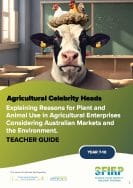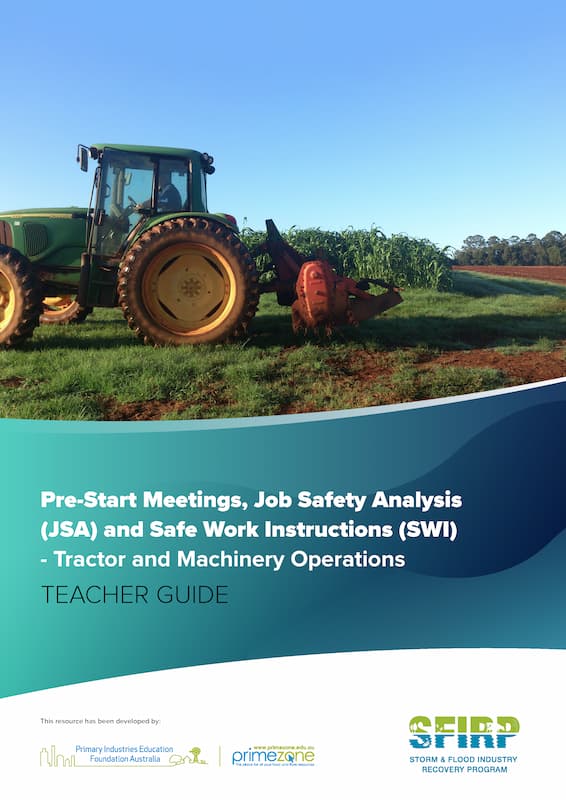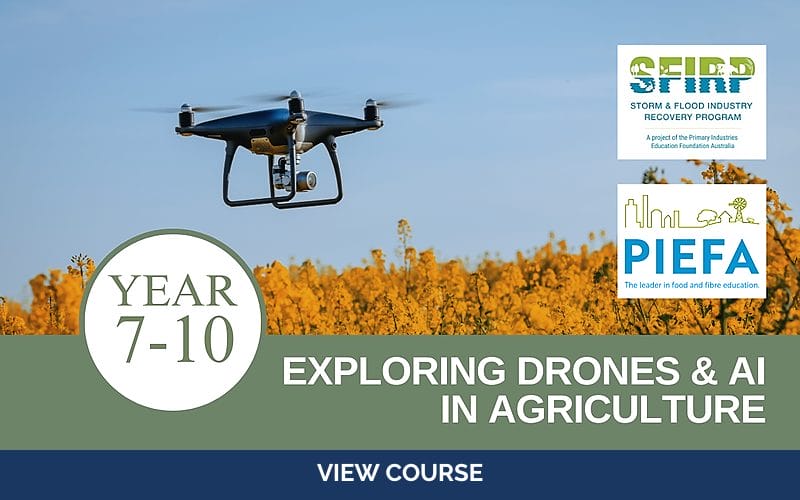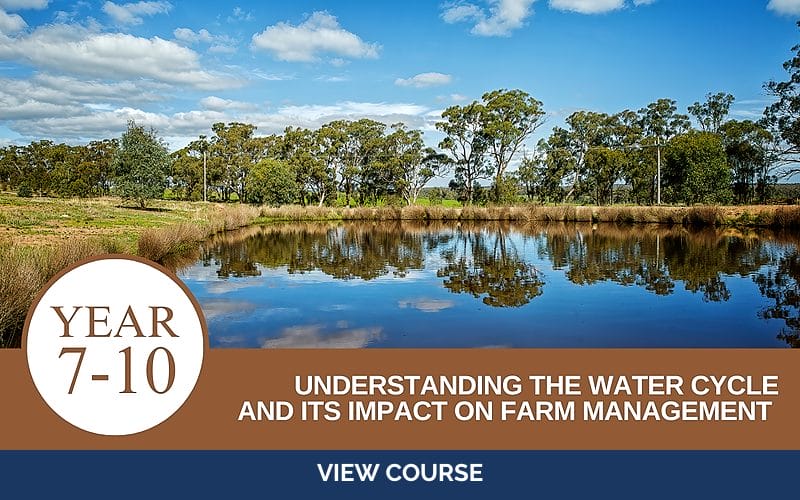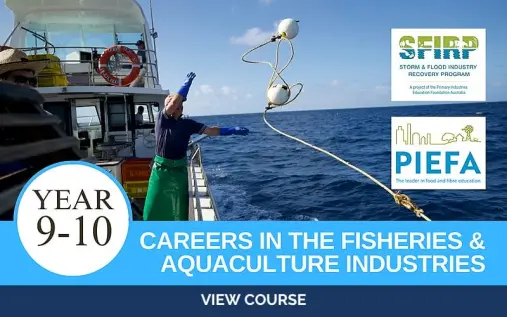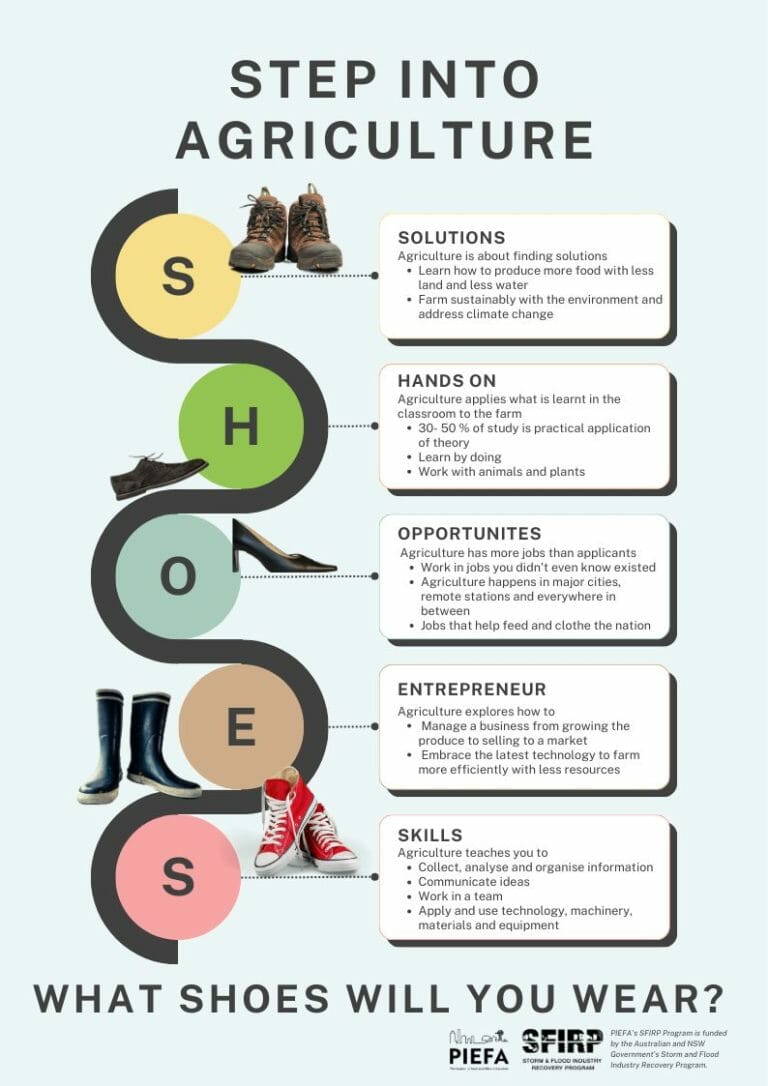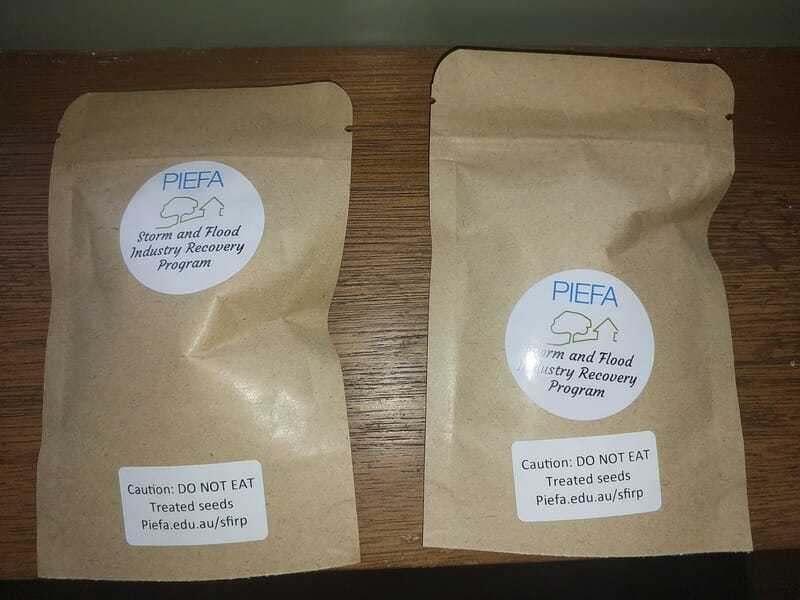Storm and Flood Industry Recovery Program
Creating Resilience through Empowering School Curriculums about Primary Industries

PIEFA’s Storm and Flood Industry Recovery Program is jointly funded by the Australian and NSW Governments under the Disaster Recovery Funding Arrangements through the Department of Regional NSW – Sector Recovery and Resilience Grants.
The project will improve community connectivity, linking schools with local primary industries and the many rewarding agricultural careers that are available in flood affected LGAs across NSW. By developing locally focussed teaching resources and careers programs, this project will deliver a stronger foundation to develop interest in local careers in the primary industries, building local resilience to improve recovery from flood disasters.
Contact
Ben Holmes, PIEFA SFIRP Project Manager
Email: Ben.holmes@piefa.edu.au | Phone: 0480 458 220
PLAN YOUR 2024 TEACHER / CAREER ADVISOR PD TODAY!
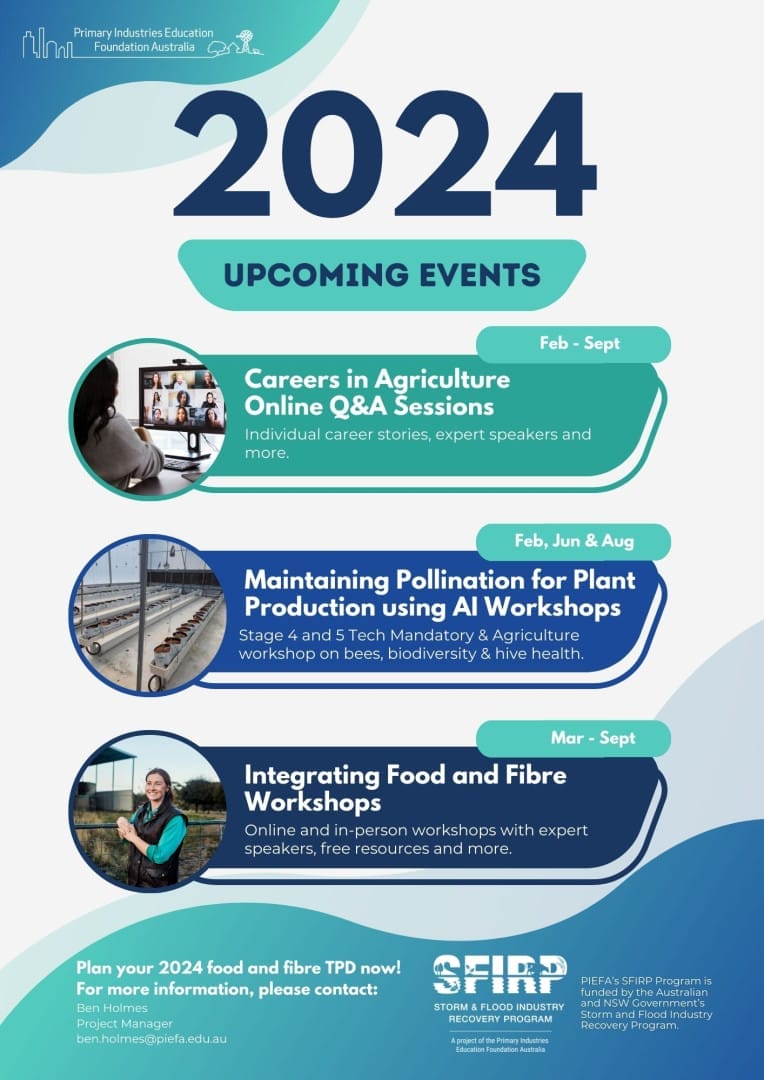
Free teacher professional development events for secondary teachers
Join PIEFA’s Storm and Flood Industry Recovery Program for face to face workshops and online events.
Upcoming Events
Free teacher professional development events for secondary teachers
Join PIEFA’s Storm and Flood Industry Recovery Program for face to face workshops and online events.
Teacher Resources
Agricultural Celebrity Heads
This resource aligns to year 7- 10 Design & Technologies and year 7 Science.
What do students know about why specific animals and plants are used in agriculture?. Do they understand the structure and function of different characteristics of the food we eat? Can they relate the features of agricultural animals and plants to the practices undertaken by farmers to manage conditions in the Australian environment and supply demands relating to market forces? This resource targeting Technology Mandatory, Agriculture and Science teachers, consists of a teacher guide, answers and a student workbook centred around an interactive and collaborative classroom playing a celebrity heads game.
Maintaining Pollination For Plant Production
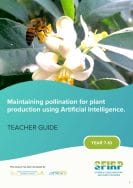 This resource is structured around the 5E pedagogical model, the resource delves into the critical role of pollinators in food production. It covers topics such as challenges, biodiversity, sustainability, innovation, and technological solutions to contemporary agricultural issues. Students will participate in a series of five activities, culminating in the creation of a team-produced video. This video can serve as a valuable form of summative assessment for their learning journey.
This resource is structured around the 5E pedagogical model, the resource delves into the critical role of pollinators in food production. It covers topics such as challenges, biodiversity, sustainability, innovation, and technological solutions to contemporary agricultural issues. Students will participate in a series of five activities, culminating in the creation of a team-produced video. This video can serve as a valuable form of summative assessment for their learning journey.
This resource is in line with the “Producing Pollinators for Improved Orchard Yields” teaching material. This comprehensive package includes a teacher guide and printable student worksheets, all designed to align with curriculum from the Stage 4 Technology Mandatory, Stage 4 Science, Stage 5 Agricultural Technologies, Science, Geography, and ISTEM courses.
Human Interactions
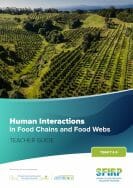 This resource for year 7 Science and year 9 Geography students will introduce them to food chains, food webs, and how human activities can affect the interactions within these systems. Students will design a food chain and food web based on the ecological interactions on Banyula farm. An overarching theme of sustainable ecosystems will be embedded throughout the lesson, along with the influence of science on agricultural practices and the management of environments.
This resource for year 7 Science and year 9 Geography students will introduce them to food chains, food webs, and how human activities can affect the interactions within these systems. Students will design a food chain and food web based on the ecological interactions on Banyula farm. An overarching theme of sustainable ecosystems will be embedded throughout the lesson, along with the influence of science on agricultural practices and the management of environments.
This resource consists of 3 activities (and optional extension activities), worksheets and answer guide. These activities will improve student’s knowledge and vocabulary around food chains and webs and will discover the regenerative agricultural practices utilised at Banyula farm.
Producing Pollinators
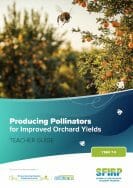 Where would we be without bees (and other pollinators)? This resource for years 7-8 will introduce students to the importance of pollinators for improving orchard yields, human management of bees for orchard pollination and the impacts of farm management on the sustainability of a farm enterprise.
Where would we be without bees (and other pollinators)? This resource for years 7-8 will introduce students to the importance of pollinators for improving orchard yields, human management of bees for orchard pollination and the impacts of farm management on the sustainability of a farm enterprise.
This resource consists of 3 activities (and optional extension activities), worksheets and answer guide. These activities will build students’ vocabulary and knowledge around pollinators and their impact on food production, assist them to develop ideas to solve existing problems, and design and build their own pollinator habitat box.
Pre-Start Meetings, Job Safety Analysis (JSA) And Safe Work Instructions (SWI)
This resource for year 9 Geography students will help them identify agricultural land at risk of flooding using satellite images and mapping. They will identify solutions in relation to land use and cropping choice to ensure sustainable food and fibre production.
This resource consists of 3 activities, worksheets and answer guide.
Reducing Flood Risks
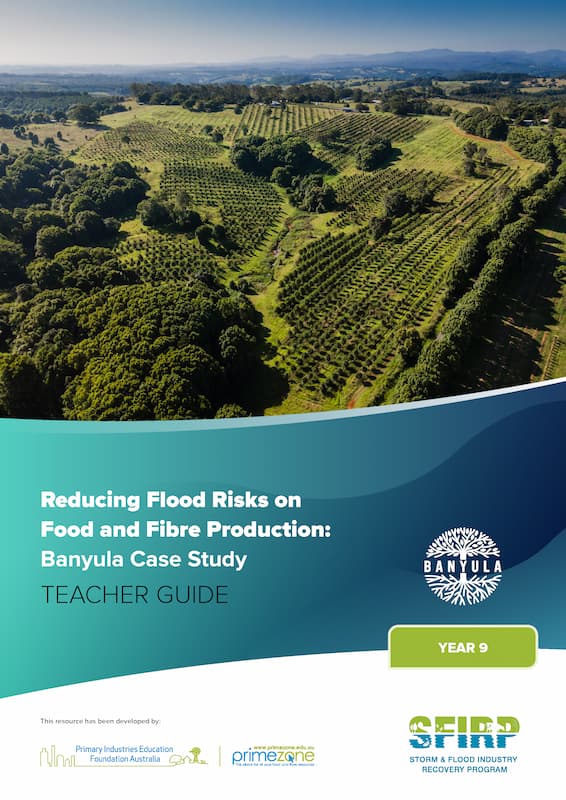
This resource aligns with Stage 6 VET Primary Industries and Stage 5 and 6 Agriculture curricula. Students will learn the knowledge and skills required to carry out enterprise work health and safety policies and procedures.
This teacher guide consists of two activities, worksheets and answer guide. These activities will improve students knowledge of workplace health and safety procedures, hazards and directions.
Farmer Time | Experts In The Field
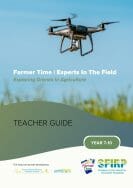 This resource for year 7-10 (Stage 4-5) Agricultural Technology, Science and Design & Technologies students will allow them to engage with four drone experts, focusing on the innovative ways drone technology in agriculture is used to improve efficiency, sustainability, and precision farming practices.
This resource for year 7-10 (Stage 4-5) Agricultural Technology, Science and Design & Technologies students will allow them to engage with four drone experts, focusing on the innovative ways drone technology in agriculture is used to improve efficiency, sustainability, and precision farming practices.
This resource consists of four activities, worksheets and an answer guide.
These activities will develop students’ knowledge and appreciation of Australian agricultural production and the impacts of drone technology on the ongoing development of agriculture in the country.
Farming A Sustainable Future
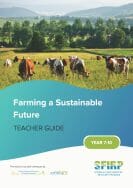 This resource for year 7-10 (Stage 4-5) Agricultural Technology, Science and Design & Technologies students will allow them to engage with a hands-on learning experience to enhance their knowledge about the application of new agricultural technologies.
This resource for year 7-10 (Stage 4-5) Agricultural Technology, Science and Design & Technologies students will allow them to engage with a hands-on learning experience to enhance their knowledge about the application of new agricultural technologies.
This resource consists of three activities, a worksheet and an answer guide. These activities will develop students’ awareness of the delicate balance of transitioning to new farming practices, whilst still ensuring the farm productivity and yields targets are achieved, enabling correlation to the importance of innovation and research in farming practices in the NSW primary industries.
Agricultural Technology
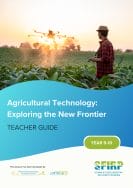 How can technology help our farmers? This resource for years 9-10 will introduce students to the history of agriculture, current Australian farming practices and the role that technology plays within the food and fibre sector.
How can technology help our farmers? This resource for years 9-10 will introduce students to the history of agriculture, current Australian farming practices and the role that technology plays within the food and fibre sector.
This resource consists of 3 activities (and an optional extension activity), worksheets and answer guide. These activities will expose students to past farming practices, how new technology can resolve issues and challenges faced by producers, build their vocabulary and share existing knowledge and ideas about agriculture and the future of farming in the digital age. Career opportunities will also be explored.
Spin the Career Cheese Wheel Career Expo Activity
 This resource is aligned with the year 7-10 Design and Technologies and NSW Agriculture Technology curriculum. The resource has two activities designed to support a school career expos, subject selection nights or career workshops in a classroom or event setting. Students will use the RIASEC test to familiarise themselves with their personality preferences that match a particular career environment within a dairy industry context. Students will develop a career web of the industry and explore a range of roles that combine to maintain the dairy food value chain.
This resource is aligned with the year 7-10 Design and Technologies and NSW Agriculture Technology curriculum. The resource has two activities designed to support a school career expos, subject selection nights or career workshops in a classroom or event setting. Students will use the RIASEC test to familiarise themselves with their personality preferences that match a particular career environment within a dairy industry context. Students will develop a career web of the industry and explore a range of roles that combine to maintain the dairy food value chain.Cotton Production as a global economic activity
 This resource for the new NSW HSC Geography syllabus will provide a niche study of cotton production for the global economic activity of agriculture within the topic of Global Sustainability. Students will examine a range of strategies for sustainability for cotton production.The teacher guide consists of two activities, worksheets and an answer guide. These activities will build students’ knowledge and understanding of the global economic activity of agriculture and cotton production, whilst developing their HSC writing skills.
This resource for the new NSW HSC Geography syllabus will provide a niche study of cotton production for the global economic activity of agriculture within the topic of Global Sustainability. Students will examine a range of strategies for sustainability for cotton production.The teacher guide consists of two activities, worksheets and an answer guide. These activities will build students’ knowledge and understanding of the global economic activity of agriculture and cotton production, whilst developing their HSC writing skills.
Spin the Career Cheese Wheel Career Expo Activity
 This resource is aligned with the year 7-10 Design and Technologies and NSW Agriculture Technology curriculum. The resource has two activities designed to support a school career expos, subject selection nights or career workshops in a classroom or event setting. Students will use the RIASEC test to familiarise themselves with their personality preferences that match a particular career environment within a dairy industry context. Students will develop a career web of the industry and explore a range of roles that combine to maintain the dairy food value chain.
This resource is aligned with the year 7-10 Design and Technologies and NSW Agriculture Technology curriculum. The resource has two activities designed to support a school career expos, subject selection nights or career workshops in a classroom or event setting. Students will use the RIASEC test to familiarise themselves with their personality preferences that match a particular career environment within a dairy industry context. Students will develop a career web of the industry and explore a range of roles that combine to maintain the dairy food value chain.Careers in Agriculture
Career Q&A Video Sessions Digital Learning Kits
These Career Q&A Digital Learning Kits have been designed to showcase the diverse career pathways and opportunities within agriculture. Each kit contains 3 videos and an associated resource.
Traditional Farming Digital Learning Kit
This Digital Learning is centred around Traditional Farming, with a focus on the cotton industry.
Discover Exciting Careers from our Industry Partners
Learn about the range of opportunities available in the Australian Agricultural Industry.
UNE Farming in the Digital Age Event Videos
SFIRP Primezone Academy Course
Discover free online Agricultural focused courses for your students
PIEFA’s Primezone Academy is the new PIEFA teaching and learning online course website. Here you will find interactive agricultural science courses your students can enrol into for free.
Teaching Resources - Activities and Worksheets
PIEFA’s SFIRP Program is funded by the Australian and NSW Government’s Storm and Flood Industry Recovery Program.


